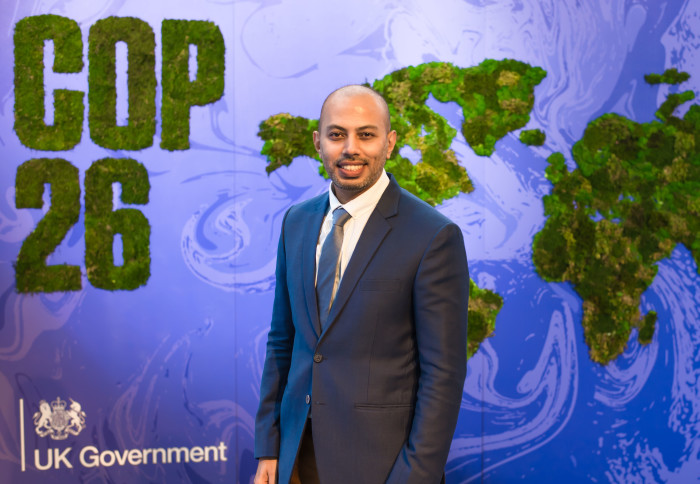Imperial’s engineers at COP26: a roundup
by Helen Wilkes

Dr Izhar Shah at COP26
Over the last two weeks, Imperial’s engineering community joined the world’s leaders and politicians in Glasgow for COP26.
A delegation of researchers, representatives from the College’s Enterprise Division and the Grantham Institute made the journey to meet with other researchers working on climate change, as well as activists and industry.
Dr Izhar Shah, Research Associate and Nick Reynard, a PhD student, are both from the Department of Civil and Environmental Engineering.
What is the focus of your research and why was it important for you to attend COP26?
Izhar: I work on assessing the environmental impact of industries and cities, their carbon footprint, and ways to reduce net greenhouse gas (GHG) emissions. With the rise in global GHG emissions, I am keen to decarbonise major sectors using technological solutions aided by advanced GHG accounting methods. I am passionate about future decarbonisation and this is where COP26 helped me understand the global perspective on climate change science and policy.
Nick: The main focus of my research is the implications of climate change on ocean circulation and the resulting consequences on tracers such as carbon and heat distributions. Within this, I work closely with the climate models that are used within IPCC reports and subsequently help inform climate policy and set climate targets. Attending COP gives me an opportunity to see first-hand where research in my field is being applied outside of the purely scientific world. After my PhD I intend to move into a climate policy related career and so listening in at the centre of global climate negotiations is an invaluable experience.

How critical do you think it is that politicians and world leaders hear from scientists and engineers and COP26?
Izhar: Scientific evidence has shown the rising global mean temperatures to more than 2 degrees Celsius if carbon emissions are not cut significantly by the end of this century. I believe this to be a global cause warranting collective action and we as scientists could bring all stakeholders to the same table using scientific and technological advice. Politicians might have to rely on public opinion but we as scientists, rely on science and facts – which on climate change are clear and point us to only one direction: we must significantly cut our carbon emissions sooner rather than later. As scientists and engineers we should seek to design technologies that decarbonise our economies as well as develop economic instruments for a smooth transition to net zero.
Nick: The role of scientists and engineers at COP cannot be understated. The basis of the key decisions made at COP should be based upon the science published within the IPCC reports, while engineers play a vital role in developing and implementing technologies that will help act on policy decisions. If the voices of scientists and engineers were not heard by world leaders and politicians then the climate change problem would simply not get solved. The fact that COP is a combination of a scientific, engineering and political but also social and health conference through its side events and discussions makes it an appropriate platform to tackle climate change.
What are your hopes for the mitigation of climate change following from COP26, and how can the scientific community hold world leaders accountable?
Izhar: Hopes are high as the call for climate action has become imperative. Since we all are or will be, affected by climate change, I hope to see all world leaders – from the global south to the west – join hands and agree on a faster carbon-neutral future path. I see this global agreement as the first step towards climate action. Developed countries could provide financial and technological assistance to developing economies, while the latter could leapfrog and phase out emission-intensive fossil fuels and industries. At the end of the day, this world is the only inhabitable planet we have got.
Nick: My initial hopes at the start COP26 for mitigation revolved around the collective newly submitted nationally determined contributions (NDCs) from the Parties to be roughly in line with what is needed set out by the IPCC to keep the 1.5 degree goal within reach. However throughout the conference several reports have made it clear that what has been pledged is simply not enough and more ambitious NDCs are needed. One of my biggest hopes is now for an agreement on adaptation and its finance to get sorted because of its immediate need today, particularly in the G77. To keep world leaders accountable the scientific community needs to keep their presence at future COPs growing and keep engaging as much as they can with the media and youth, not just staying within their scientific bubble. The media and youth activism are great tools that get messages out to the masses quickly and in an understandable way, and importantly aren’t afraid of naming and shaming world leaders when they do not keep to their promises!
Dr Rebeca Santamaria-Fernandez, Director of Industry Partnerships and Commercialisation for Engineering also attended several meetings in Glasgow during COP26 along with Imperial’s Vice Provost (Research and Enterprise), Professor Mary Ryan.
Rebeca and Mary took part in an event with Enterprise Holdings and Brompton Bikes where they discussed their pathway to net zero and Imperial’s ongoing partnership and future collaboration. They also represented Imperial at the CBI COP26 International Business Dinner which gathered global business leaders, and the Hitachi European Innovation Forum where Professor Ryan presented with Hitachi on our joint plans going forward to establish a Research Centre for Decarbonisation and Climate Repair sponsored by Hitachi Energy.
Article text (excluding photos or graphics) © Imperial College London.
Photos and graphics subject to third party copyright used with permission or © Imperial College London.
Reporter
Helen Wilkes
Faculty of Engineering